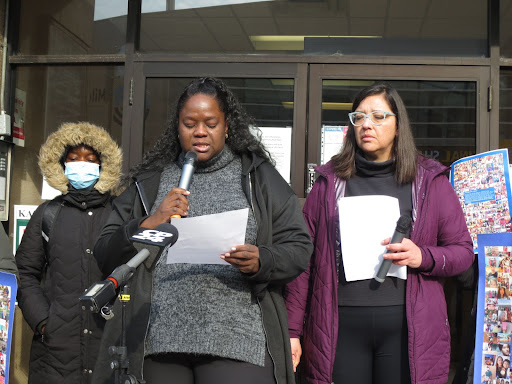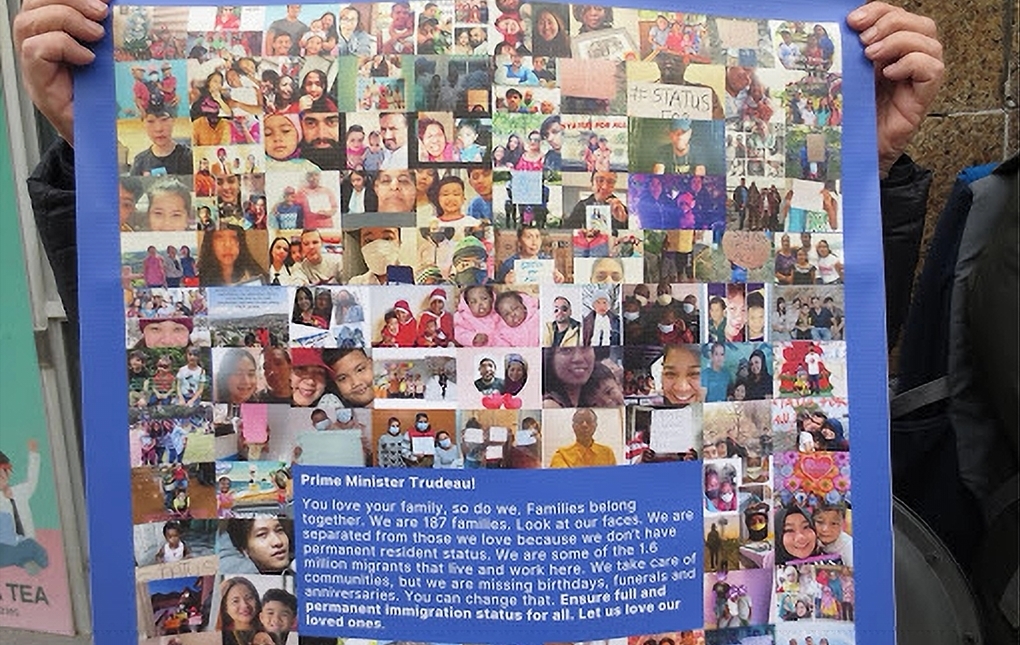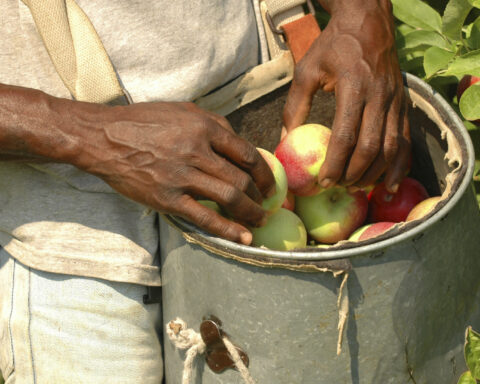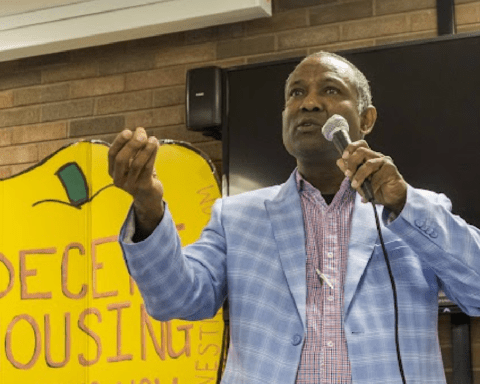While most Ontarians celebrated Family Day on Monday, a group of migrant care workers, farmworkers, and refugees gathered outside Deputy Prime Minister Chrystia Freeland’s Toronto office to protest Canada’s immigration and labour policies which they argue perpetuate separations of families and precarious immigration status.
Showing images of their loved ones, migrant workers from Indonesia and Mexico, among others, mailed a photo-letter containing over 200 photos of families addressed to Prime Minister Justin Trudeau and all 338 Members of Parliament.
“Look at our faces. We are separated from those we love because we don’t have permanent resident status,” states the letter.
According to the Migrant Workers Alliance for Change, the organizer of the demonstration, 1.6 million people in Canada are temporary workers, international students, refugee claimants or undocumented residents who have no access to permanent resident status.
Tina Weeska, from Indonesia, has been working as a caregiver since 2018. She applied for permanent residency under a pathway program to bring her husband and son, but until now her case is still in process.
“We are mostly women separated from our families, while taking care of other families,” she said as she showed the photo of her son, whom she can no longer sponsor because he is over 22 years old.
“How can I leave my son alone back home if my husband comes here to stay with me in Canada?” she wonders. “This long separation is ridiculous.”
Unable to hold back tears, Weeska shared that her work permit will expire next month before concluding with a clear demand: “No more backlog!”
Currently, Immigration, Refugees and Citizenship Canada has an immigration backlog of almost 2 million applications, including over 16,000 migrant care workers. For them, the recent announcement from Immigration Minister Sean Fraser that Canada will be accepting 432,000 immigrants this year offers no clear plans for clearing the application backlogs first.
“Migrants are missing birthdays, anniversaries and funerals, which causes psychological and emotional distress, family breakdowns and crises,” the organizers say.
‘Trudeau can end this’
In October 2007, former Liberal premier Dalton McGuinty created Ontario’s Family Day, a statutory holiday on the third Monday of February, to allow families a relaxing time during the long winter. “There is nothing more valuable to families than time together,” McGuinty said at the time.
Queen Gabriel, from Trinidad and Tobago, has been working in Canada for the past 10 years as a personal support worker but has been rejected three times for permanent residency. Throughout that time, she has lost her great aunt, husband, brother and last year her father. She was unable to say goodbye to any of them.

“All I can see was pictures of them in a casket. How would you feel if your relative passes away and you can’t hold them, you can’t come for them in the last days, you can’t have any closure?” Gabriel says.
For her, this is not a Family Day.
“Today is the day that is supposed to enjoy our loved ones. Instead, we are separated from them. Nothing is being ended,” she says referring to the apparently never-ending backlog, adding there are people with more than 20 years working without permanent status.
“Prime Minister Trudeau can end this. Give permanent status for people who are contributing to the economy and society,” she told NCM.
Walking with some difficulties for an injury to her left foot that required medical attention and a walking boot, Gabriel explained that she had to pay for this medical situation out-of-pocket.
“If you don’t have permanent residence status, you don’t qualify for these things,” she says.
Migrant Workers Alliance, the organization that helped a farmworker in his historical lawsuit in 2020 against the Scotlynn Farms where he contracted COVID and where his friend died, says despite multiple promises and announcements to fix the gap, over 16,000 migrant care workers who have been separated from their families for years “have not been provided any assurances.”
‘It is agonizing to be so far away’
Speaking through a phone from a Niagara farm where she works, and identifying only as Celia because she doesn’t want to jeopardize her job, the 55-year-old temporary worker says she has spent much of the last 23 years separated from her family, including her daughter who suffers asthma.
She is one of the more than 23,000 Mexican farmworkers that come to Canada every year for up to eight months to harvest fresh food for Canadians as part of the Mexico-Canada Seasonal Agricultural Worker Program (SAWP) that has operated since 1974.
Celia left her daughter to come work in Canada for the first time when she was six years old. Though she sees her for a few months every year, Celia says she has missed all her daughter’s graduations and birthdays. Afraid to lose her job, she says at times she has even been unable to fly home to care for her when she’s had an asthma-related crisis.
“It is agonizing to be so far away without being able to touch them, without hearing their voices looking for mom, looking for a hug, without knowing if she has eaten, missing all the changes that day by day a child lives,” Celia says in Spanish.
She also points out that separation from families sometimes drives people to self-medicate, including with drugs and alcohol, and can cause teenage pregnancies due to the “family disintegration that this temporary program causes.”
Migrant advocates explained that the photo-letter sent to the 338 MPs is to remind them that “we are families too.” They also urged the MPs to “stick it to your fridge, keep it on your desk, (and) fight for us.”
Isabel Inclan has worked as a journalist for more than 20 years, in both Mexico and Canada. She began working as a foreign correspondent in Canada in 1999 for Mexican media. She has been a New Canadian Media contributor since 2018. Her main areas of interest are politics, migration, women, community, and cultural issues. In 2015, Isabel was honoured as one of the “10 most influential Hispanic Canadians.” She is a graduate of Masters in Communication and Culture at TMU-York University. She is a member of CAJ and a member of the BEMC´s Advisory Committee.






We Refugees healthcare workers and undocumented immigrants has done so much for this economy…some of us work 20hrs a day..taking care of Canadians and putting our lives on the line just to see this pandemic go away…we work in hospitals day and night without much sleep…all we’re asking the government for is to grant us at least just a pathway to permanent resident status for every Refugees healthcare essential workers and undocumented immigrants ..we’re working in hospitals but if anything happens to us or received injured on the job, we will have to pay from our pocket because we don’t have a permanent resident status….we are risking our lives everyday and still worried about our status situation…hope the Government of Canada will really look into our situations and create a pathway to permanent resident status for every Refugees healthcare essential workers and undocumented essential workers….to be precise; I am speaking as a Refugee healthcare worker.